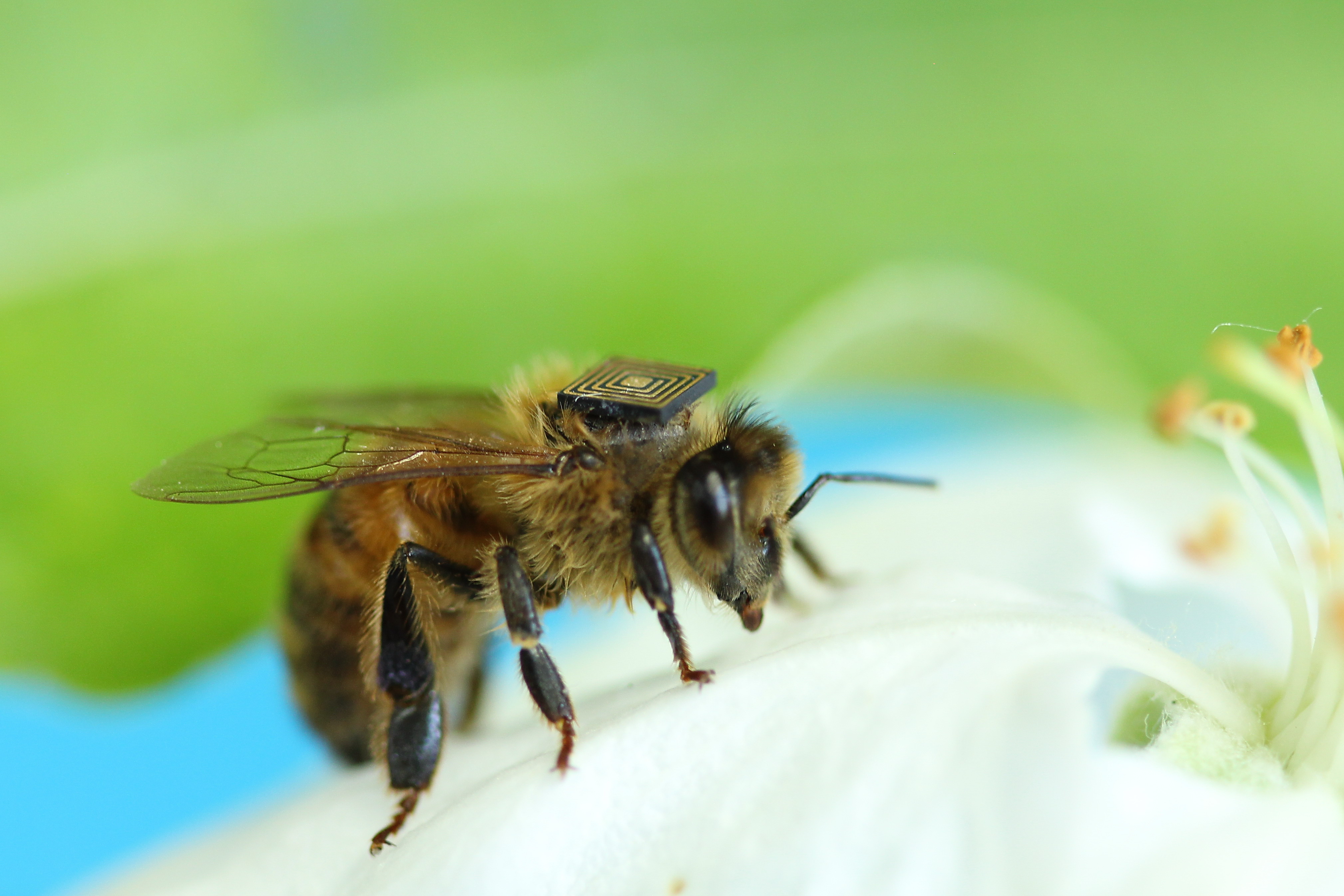Bees with Backpacks inspires students to use data

Bees are tracked using high-tech micro-sensors that look like backpacks. Image credit: CSIRO.
In summary
- Bees with Backpacks is a Victorian Government-funded program delivered in collaboration with CSIRO
- Bees are tracked using high-tech micro-sensors that look like backpacks
- Expert STEM educators from Swinburne’s KIOSC teach students to analyse data and design solutions to challenges facing bees
Swinburne University of Technology is facilitating the multidisciplinary program ‘Bees With Backpacks’, allowing local high school students to help save local bees.
Bees with Backpacks is a Victorian Government-funded initiative delivered in collaboration between CSIRO and the Department of Education and Training.
The program connects scientists, Swinburne educators and high school students. It involves manually fitting bees with high-tech micro-sensors (which happen to look like cute little backpacks). The micro-sensors pick up data on where the bees travel, how long they spend there and what they do.
Data61 and CSIRO’s provide the micro-sensor technology, tag the bees and work with the data.
The Bees with Backpacks program is facilitated by STEM educators at the Knox Innovation Opportunity and Sustainability Centre (KIOSC), a joint initiative between Swinburne and local secondary schools.
The Victorian Government funds Swinburne approximately $1 million annually to operate KIOSC as part of its commitment to ignite students’ interest in STEM and STEM careers, and build students’ 21st century skills and capabilities for jobs of the future.
KIOSC is one of a number of STEM centres of excellence that participates in the program and works alongside tech schools in Geelong, Ballarat, Bendigo and Yarra Ranges in delivering this opportunity to Victorian students.
Local beekeepers manage the hives – some of which are on-site at tech schools – and those schools share the data with others in the program locally. Educators from KIOSC and other STEM centres support participating students to analyse the data collected and create solutions that have a real-world impact.
If the bees go, we go
Bees are vital to our ecosystems. Aside from producing honey, these incredible insects are key to the multi-billion-dollar agriculture industry.
However, bees are dying at such drastic rates they could be heading for mass extinction and scientists don’t know why.
Bees with Backpacks could help us uncover the risks and challenges faced by local bee populations, and what we can do to protect them, while also providing a unique learning opportunity for high school students.

Video credit: Geelong Tech School
Utilising the hive mind
Through Bees with Backpacks, students can follow the trajectory of a single bee or investigate the effects of stress factors for bees in their local area – such as disease, pesticides, diet, air pollution, water contamination, extreme weather and more.
They can create dashboards, visualise data and make connections that CSIRO and local beekeepers might not have made yet. At the end of the program, they come up with solutions using a design thinking process to compete in the Design Challenge.
It’s a multidisciplinary project, teaching students the skills in humanities, data management and visualisation, technology, programming, robotics, marketing and more. That’s saying nothing of the soft skills students pick up along the way, including communication, collaboration, presentation skills, problem-solving and confidence in their ability to innovate.
“Once we take the students through design thinking, that’s when the magic happens,” Director of KIOSC, Dr Kulari Lokuge Dona says.
Last year, students from one of KIOSC’s classes placed second in the Design Challenge with a sophisticated solution designed to protect bees from wind direction changes they’d identified. Ideas like this can actually make a difference to bee populations, and students are encouraged to put them into action if they want.
“Some groups will go on to create a bee-friendly school or home backyard. They are also invited to take it further as a startup or business, but it all depends on if they want to run with it. And sometimes the local beekeepers might want to use the idea,” Kulari adds.
Technology that gets students buzzing
For many students, this is their first exposure to what it would be like to study STEM at university or pursue a science or technology career.
Kulari says, “Some students, like those from low socio-economic status schools, have never had an opportunity like this. It’s very rewarding from the educator’s point of view to see a student like that be able to collaborate in a team, to find a solution to a problem that fascinates them, then to present to a big group of people. It’s a real transformation from that first day.”
-
Media Enquiries
Related articles
-

- Technology
- Science
- Engineering
Victorian students drive green energy transition through international hydrogen competition
Swinburne’s KIOSC, in collaboration with Horizon Educational and Gippsland Tech School, co-hosted the Hydrogen Grand Prix in Melbourne.Friday 26 July 2024 -

- University
The future of fashion: Swinburne launches groundbreaking tech-focused fashion course
Swinburne University of Technology is fusing high tech and high fashion to launch a new forward-thinking Bachelor of Design (Fashion).
Thursday 25 July 2024 -

- Science
Skin, scales and fish tails: using collagen to turn fish guts into gold
New research from Swinburne could transform the sector by converting high value collagen proteins from seafood by-products into cosmetics, food, and pharmaceuticals.
Tuesday 02 July 2024 -

- Education
- Engineering
Transforming the lives of refugee engineers through the EPIC Program
Swinburne has been partnering with the Level Crossing Removal Project (LXRP) on the Engineering Pathway Industry Cadetship (EPIC) program, helping refugee engineers gain international qualifications for the Australian workforce through an 18-month paid cadetship program.
Thursday 20 June 2024 -

- Science
- Engineering
Submarines in the future could self-identify cracks and self-heal thanks to Swinburne researcher
Thanks to the work of Dr Nisa Salim from Swinburne University of Technology’s School of Engineering, future submarines could self-identify microcracks and self-heal using a new kind of carbon fibre reinforced polymer composites.
Monday 17 June 2024

